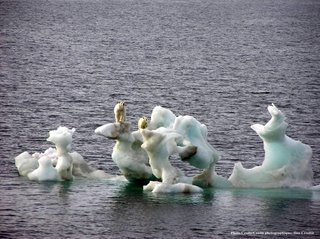
We saw Al Gore's film today and I am just about ready to move to the Arctic to build rescue rafts for the polar bears. It's one thing for humans to screw up our own existence but we have to make other species suffer with us. We are incredibly lousy stewards of this planet. To use a metaphor from the dominant paradigm, if the planet were a business God set us up with, we have been "running" it with all savvy and sensitivity of, say, G.W. Bush. No wonder he's our president.
It's weird...it's not like much of the information in the film was news to me, but perhaps the presentation and the visuals gave it more impact. I was / am so upset that after the movie when I rode my bike to the Co-op, to post an agenda for our next board meeting and buy a few things, I picked up a hand of bananas and put them down again because the sticker on them announced they had come from far, far, away.
So here's a dilemma: these bananas are certified fair trade and organic. These particular bananas were from Peru. After all the damage U.S. foreign policy has done to South America in the last several decades, does the good I can do by supporting fair-trade organic agriculture in those places outweigh the bad pollution generated by shipping bananas from Peru to Chico, California? Coffee poses a similar problem. As far as I know, the nearest coffee plantations are in southern Mexico. I can get "Triple Certified" coffee which is 1) organically grown 2) shade grown, so as not to ravage the rainforests and leave the songbirds homeless, and 3) fair-trade so that the farmers get a decent price for their beans and hopefully can support themselves and their families. I feel like this is the least I can do if I'm going to drink the stuff. BUT, the shipping! There's the rub.
At the Co-op I also purchased a package of spicy veggie dogs (on sale) only to read the fine print after I got home and learn they came from Canada. Closer than Peru, but not exactly local. I just don't know what level of emission-conscious orthodoxy I can maintain. If I abstain from bananas and coffee on ecological grounds, it would be a personal ethical statement as opposed to an action likely to have any measurable impact, and I like the idea of my American dollars supporting organic farming in other lands. I also really like bananas and coffee, and no doubt countless other things that have been shipped halfway 'round the world. However I am also lucky to live in California where in theory we could feed ourselves pretty well without crossing oceans or continents. If I wanted to, I could be well nourished on things that came from within 100 miles of Chico. (20 miles, if I switch to a diet of rice and almonds.) I could even have decent cheese and some of the best ice cream on earth if I extended that to 200 miles or so.
What to do. Maybe I should start with the things that seem easier. I can ensure, at least, that the final stage of the journey of my food and drink is not gasoline-powered. Eventually when I get a trailer for my bike I will never really need to drive to buy groceries again; as it is now, only the 20-lb bags of cat litter and occasional large water jugs are an obstacle. We can buy more food from the farmers' market. And I'm on the Co-op board, so I can try to give the "buy local" campaign more of a push. Our patio / yard in the current location isn't gardenable; maybe I could borrow a piece of someone else's yard until we have our own. Anything to absorb a little more of the CO2 I create. Anything to help the polar bears hang on a little longer, and the local farmers while we're at it.
On a related topic: in a recent post I mentioned that our emergency roadside assistance company is not AAA. Here's why.
1 comment:
Have you heard of the "100 mile diet"? It seems like a good, low carbon way to live.
http://www.treehugger.com/files/2005/07/living_on_the_1_1.php
One time when I was in Indonesia i saw a bin of red delicious apples from Washington in a supermarket. Those things get everywhere.
Post a Comment